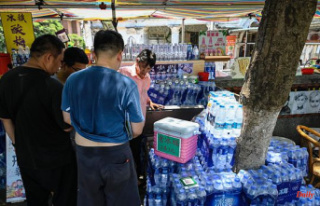Bourg-en-Bresse, Lyon, Besançon, Paris... While France experienced an exceptional heat wave, several municipalities have issued municipal decrees since mid-July for air-conditioned stores to close their doors, under penalty of a fine. The government plans to generalize this to the whole country. The Minister for Energy Transition Agnès Pannier-Runacher announced on Sunday July 24 future decrees to force air-conditioned stores to close their doors and reduce illuminated advertising.
"In the next few days, I will issue two decrees: the first generalizes the ban on illuminated advertisements regardless of the size of the city between 1 a.m. and 6 a.m.", with the exception of airports and train stations, and "The second prohibits stores from having their doors open while the air conditioning and heating are working," the minister explained to the Journal du Dimanche (JDD). Leaving the doors open, "it's 20% more consumption and (...) it's absurd", justified Agnès Pannier-Runacher this time on RMC.
"Two obligations that everyone can understand, with or without a gas crisis," government spokesman Olivier Véran added on LCI on Sunday. "It's part of everyday things, which we can do for each other, which are good for the planet and which are good for this period when we are going to have difficulty accessing gas or electricity. electricity," he added.
Air-conditioned stores that do not close their doors are liable to a fine of 750 euros, but the government will initially focus on informing traders. As for illuminated advertising, the current regulations distinguish agglomerations of more or less 800,000 inhabitants: it is prohibited between 1 a.m. and 6 a.m. in France in those of less than 800,000 inhabitants. In more populated ones, the rules depend on the local advertising regulations (RLP) if there is one. The current law also already obliges to turn off illuminated signs and shop windows from 1 am.
The Ministry of Energy Transition was unable to specify the content of the next decree on Sunday, but explains that it will aim to "harmonize the rules", without specifying the number of agglomerations today covered by an RLP or concretely how controls and sanctions, up to 1500 euros, will be implemented. “The contours will be specified” when the decree comes out, “the idea is really that this should be applicable now”, added the ministry.
“The framework already exists: it is quite simply a question of putting into practice the devices provided for by law, which are not necessarily respected” such as “the extinction of illuminated signs and the extinction of offices after the working day”, reminded L'Express of the former deputy of Gard (LREM) Anthony Cellier, who recently ceded his functions at the head of the Higher Energy Council.
Today, non-compliance with the regulations, which have existed since 2013, is not sanctioned very much. Olivier Véran admitted that a period of tolerance would be applied: "There are not going to be police behind each trade". "The challenge remains to enforce these texts by those who have public responsibility for them: the communities and the State", commented for its part recently the association ANPCEN, which fights against light pollution.
"To date, not only does the State not carry out the checks at its expense, but returns the responsibility to the voluntary associations", she denounces. The Citizen's Convention for the Climate, wanted by Emmanuel Macron, was much more ambitious and had proposed to the government "the banning of these screens (advertising videos) in public space, public transport and in points of sale", proposal that had been discarded.
Recently, large retailers agreed on "a strong strategy to reduce" their energy consumption. These first measures, taken by E.Leclerc, Carrefour, Système U, Les Mousquetaires Intermarché, Auchan, Casino, Franprix, Monoprix, Lidl and Picard, must be deployed from October 15, 2022.
The Perifem federation, which brings together all the distribution players to act on energy or environmental issues, mentioned "the risk of electricity supply shortages announced by the government for this winter", which is prompting it to define “common and concrete measures” deployed from October 15.
It is thus planned to turn off the illuminated signs "as soon as the store closes" - against generally one hour after closing at present - and to "systematize the reduction in light intensity", by halving the lighting of the surface. sales before the public arrives and 30% during "critical periods of consumption". Other measures are also planned, such as "cutting off air renewal at night, delaying ice production" and emergency measures, in particular providing for lowering the temperature of points of sale to 17 degrees this fall and this winter, if requested by a regulatory authority.
These first measures are also cost-saving measures for retailers, in the face of rising energy costs. While "the electricity bill represented 30%" of the net income of the brands "before the recent surges in energy costs", it is "essential to reduce the energy bill and to mobilize together to avoid too significant an impact on the price for consumers", recognizes the Perifem federation. The Élan law also provides for a 40% reduction in energy consumption in stores by 2030.
Emmanuel Macron explained on July 14 that the state was preparing an energy "sobriety plan" to deal with the risk of shortages linked to the war in Ukraine, calling for "collectively entering into a logic of sobriety".












